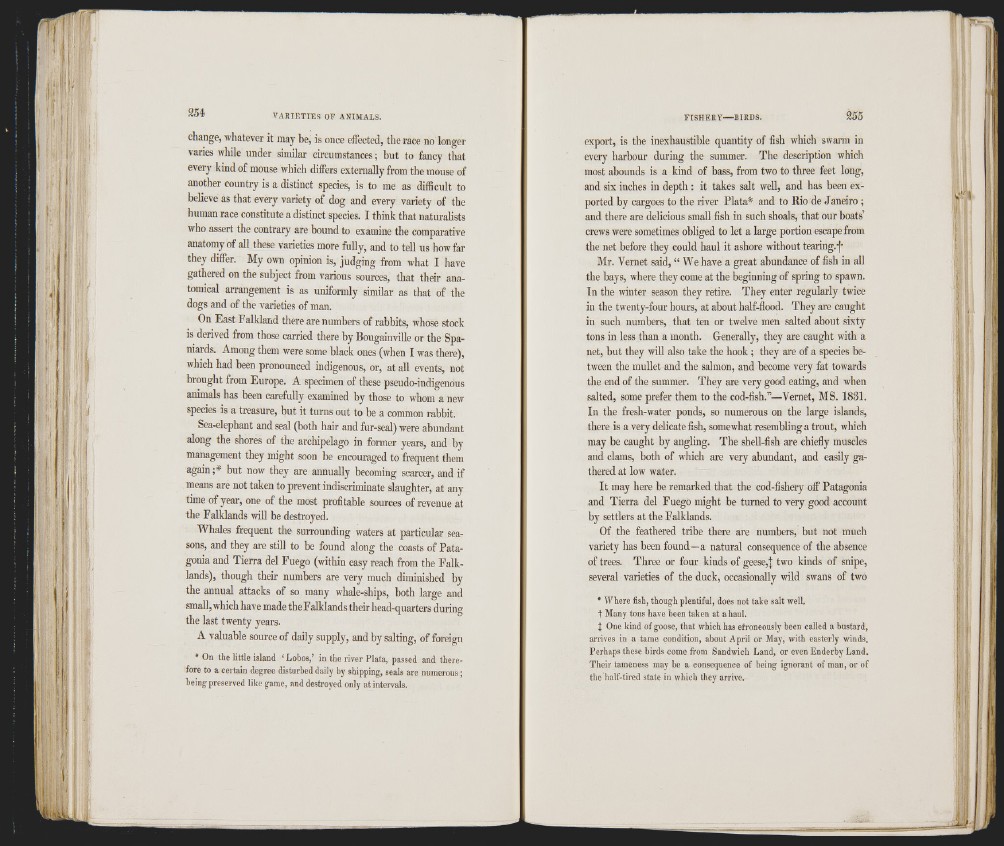
il
m h
Mi
'h
■ -III
‘■il
11.i l
change, whatever it may be, is once effected, the race no longer
varies while under similar circumstances ; but to fancy that
everj' kind of mouse which differs externally from the mouse of
another country is a distinct species, is to me as difficult to
believe as that every variety of dog and every variety of the
human race constitute a distinct species. I think that naturalists
who assert the contrary are bound to examine the compai-ative
anatomy of all these varieties more fully, and to tell us how far
they differ. My own opinion is, judging from what I have
gathered on the subject from various sources, that their anatomical
arrangement is as uniformly similar as that of the
dogs and of the varieties of man.
On East Falkland there are numbers of rabbits, whose stock
is derived from those carried there by Bougainville or the Spaniards.
Among them were some black ones (when I was there),
which had been pronounced indigenous, or, at all events, not
brought from Europe. A specimen of these pseudo-indigenous
animals has been carefully examined by those to whom a new
species is a treasure, but it turns out to be a common rabbit.
Sea-elephant and seal (both hair and fur-seal) were abundant
along the shores of the archipelago in former years, and hy
management they might soon be encouraged to frequent them
again;* but now they are annually becoming scarcer, and if
means are not taken to prevent indiscriminate slaughter, at any
time of year, one of the most profitable sources of revenue at
the Falklands will be destroyed.
Whales frequent the surrounding waters at particular seasons,
and they are still to be found along the coasts of Patagonia
and Tierra del Fuego (within easy reach from the Falklands),
though their numbers are very much diminished by
the annual attacks of so many whale-ships, both large and
small, which have made theFalklands their head-quarters during
the last twenty years.
A valuable source of daily supply, and by salting, of foreign
• On the little island ‘ Lobos,’ in the river Plata, passed and therefore
to a certain degree disturbed daily by shipping, seals are numerous ;
being preserved like game, and destroyed only at intervals.
export, is the inexhaustible quantity of fish which swarm in
every harbour during the summer. The description which
most abounds is a kind of bass, from two to three feet long,
and six inches in depth : it takes salt well, and has been exported
by cargoes to the river Plata* and to Rio de Janeiro ;
and there are delicious small fish in such shoals, that our boats’
crews were sometimes obliged to let a large portion escape from
the net before they could haul it ashore without tearing.!
Mr. Vernet said, “ We have a great abundance of fish in all
tbe bays, where they come at the beginning of spring to spawn.
In the winter season they retire. They enter regularly twice
in the twenty-four hours, at about half-flood. They are caught
in such numbers, that ten or twelve men salted about sixty
tons in less than a month. Generally, they are caught with a
net, but they will also take the hook ; they are of a species between
the mullet and the salmon, and become very fat towards
the end of the summer. They are very good eating, and when
salted, some prefer them to the cod-fish.”—Vernet, MS. 1831.
In the fresh-water ponds, so numerous on the large islands,
there is a very delicate fish, somewhat resembling a trout, which
may be caught by angling. The sheU-fish are chiefly muscles
and clams, both of which are very abundant, and easily gathered
at low water.
I t may here be remarked that the cod-fishery off Patagonia
and Tierra del Fuego might be turned to very good account
by settlers at the Falklands.
Of the feathered tribe there are numbers, but not much
variety has been found—a natural consequence of the absence
of trees. Three or four kinds of geese,] two kinds of snipe,
several varieties of the duck, occasionally wild swans of two
* Where fish, though plentiful, does not take salt well.
t Many tons have been taken at ahaul.
X One kind of goose, that which has efroneously been called a bustard,
arrives in a tame condition, about April or May, with easterly winds.
Perhaps these birds come from Sandwich Land, or even Enderby Land.
Their tameness may be a consequence of being ignorant of man, or of
the half-tired state in which they arrive.
■il i